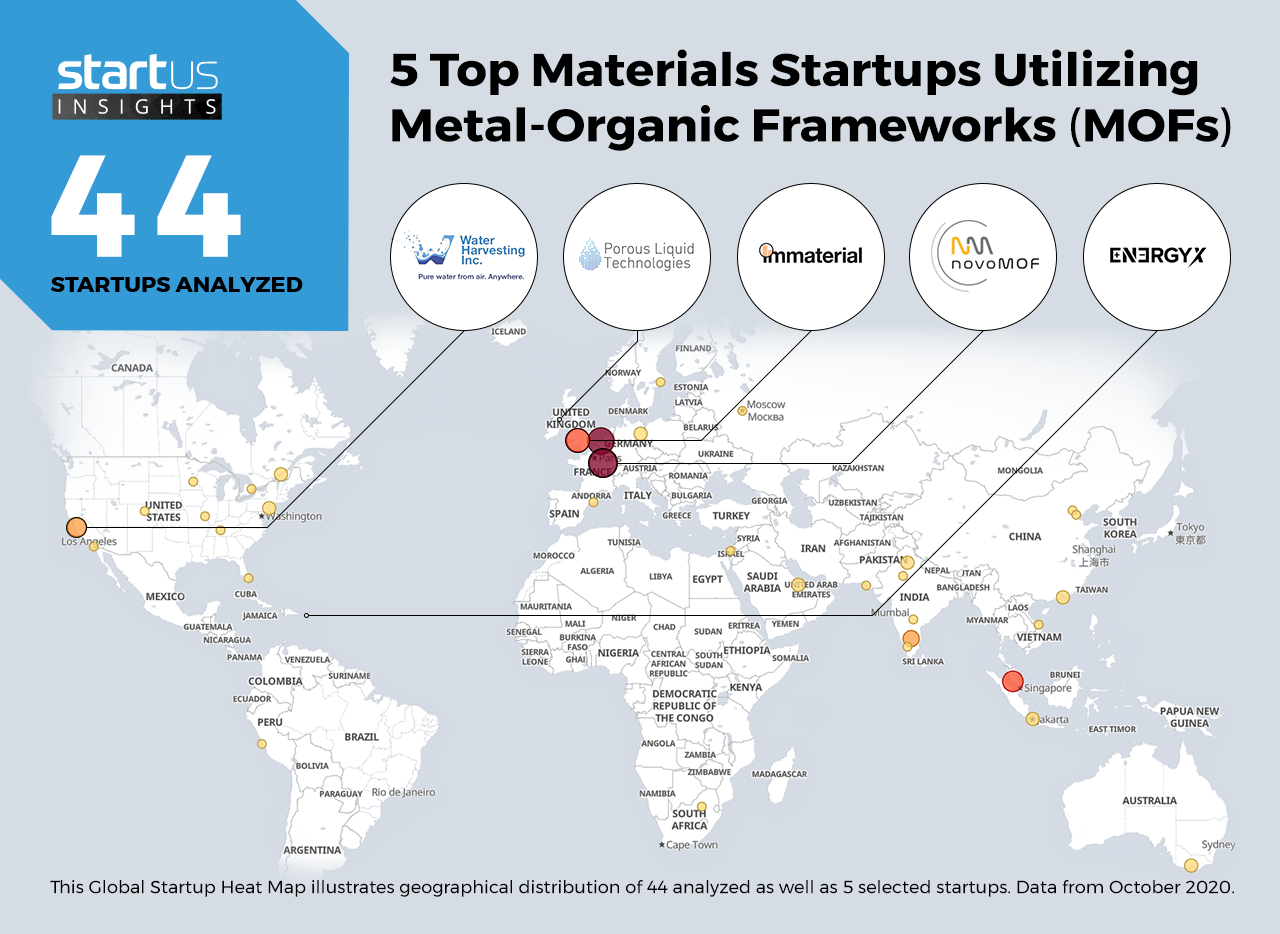Our Innovation Analysts recently looked into emerging technologies and up-and-coming startups working on innovative solutions for the materials sector. As there is a large number of startups working on a wide variety of solutions, we decided to share our insights with you. This time, we are taking a look at 5 promising solutions utilizing metal-organic frameworks (MOFs).
Heat Map: 5 Top Metal-Organic Framework Solutions
Using our StartUs Insights Discovery Platform, covering 1.379.000+ startups & scaleups globally, we looked at innovation in the field of chemical compounds. For this research, we identified 44 relevant solutions and picked 5 to showcase below. These companies were chosen based on a data-driven startup scouting approach, taking into account factors such as location, founding year, and relevance of technology, among others. Depending on your specific criteria, the top picks might look entirely different.
The Global Startup Heat Map below highlights 5 startups & scaleups developing innovative metal-organic framework solutions. Moreover, the Heat Map reveals regions that observe a high startup activity and illustrates the geographic distribution of all 44 companies we analyzed for this specific topic.
novoMOF – Custom Metal-Organic Frameworks (MOFs)
Metal-organic frameworks are porous, crystalline materials that are enabling new applications, including in gas separation, catalysis, and carbon capture. Startups innovate with different metals, organic linkers, and chemistries to synthesize MOFs with different properties. Moreover, these materials are highly stable, light, versatile, and have tunable porosity.
novoMOF is a Swiss startup that develops advanced materials, with a focus on MOFs. The startup synthesizes and tests custom MOFs for the needs of its customers. novoMOF’s process is scalable and enables production ranging from gram to kilogram quantities. The solutions find applications in toxic gas detection and hydrocarbon separation, as well as in other industrial applications.
Immaterial – Adsorbent Nanomaterials
The porous nature of MOFs, as well as their chemical functionality, allows these materials to adsorb different chemicals. The customizability of both porosity and chemical reactions provides MOFs with higher capacity and specificity than existing adsorbents. Startups are working on techniques to create MOFs in a cost-effective, scalable, and sustainable manner.
British startup Immaterial produces super-absorbent nanomaterials based on MOFs. The startup uses its expertise in materials and process design, monolithic formation, and catalysis to design MOFs with specific pore sizes and surface chemistries. Immaterial’s solutions find applications in automotive fuels, heating, and ventilation, as well as air-conditioning and targeted drug delivery.
EnergyX – Energy Storage
Developments in high-density energy storage are necessary for the power supply of growing electric vehicles (EVs), as well as portable electronic devices. MOFs are excellent electrode materials because of their unique morphology and metal sites that hold a charge. Startups are exploring MOFs and their derivatives for applications in energy conversion and storage.
EnergyX is a Puerto Rican cleantech startup that offers lithium-based solutions for energy storage. The startup’s proprietary technology enables the synthesis of mixed matrix membranes in a thin film format. LiTAS uses metal-organic frameworks nanoparticles that selectively separate monovalent lithium ions. The solution also finds applications in lithium refinery and solid-state battery systems.
Water Harvesting – Atmospheric Water Harvesting
In recent years, there has been a focus on atmospheric water generators that capture water from humid air as a means to tackle water scarcity. Specifically, innovations in novel materials provide scalable ways to turn vapors into water. To this end, startups are working on MOF-based solutions that capture water, even in desert climates.
The US-based startup Water Harvesting develops an atmospheric water harvesting solution. The startup’s technology employs MOFs to extract water from the air. The highly specific process ensures high water purity with low energy requirements. It is also effective at relative humidity levels as low as 15%.
Porous Liquid Technologies – Porous Liquids
While MOFs are generally available as solid materials, recent developments show that they maintain their desirable properties in the liquid state. Moreover, the fluidity of liquid MOFs enables their transport via pipes, opening up many novel applications. Porous liquids dissolve large amounts of gases, offering improvements over other solvents.
Porous Liquid Technologies is an Irish startup that synthesizes porous liquids based on MOFs. The startup’s technologies find application in hydrocarbon separations, biomass-derived energy, and carbon capture. These scalable solutions are chemically and thermally stable and also have tunable selectivity.
What About The Other 39 Solutions?
While we believe data is key to creating insights it can be easy to be overwhelmed by it. Our ambition is to create a comprehensive overview and provide actionable innovation intelligence and enable you to achieve your goals faster. The 5 solutions utilizing metal-organic frameworks showcased above are promising examples out of 44 we analyzed for this article. To identify the most relevant solutions based on your specific criteria, get in touch.









